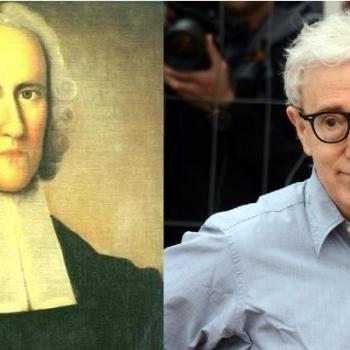The birthdays in the previous post are from Dr. Mac's Cultural Calendar, which also notes that today, Sept. 23, is also in a sense the birthday of a peculiarly American version of Christianity.
On this day in 1667 in Williamsburg, Virginia, a law was passed barring slaves from obtaining their freedom by converting to Christianity.
Consider what the implications of this were for these Christian slaves and the Christians who bought and sold them. How could these Christians read together the words of St. Paul's letter to the slave-owner Philemon, delivered on behalf of Philemon's runaway slave Onesimus?
Perhaps the reason he was separated from you for a little while was that you might have him back for good– no longer as a slave, but better than a slave, as a dear brother. He is very dear to me but even dearer to you, both as a man and as a brother in the Lord.
Or how could these Williamsburg Christians read this, from Paul's epistle to the Galatians?
For all of you who were baptized into Christ have clothed yourselves with Christ. There is neither Jew nor Greek, slave nor free, male nor female, for you are all one in Christ Jesus.
The law in Williamsburg, which was later embraced throughout the colonies (slavery, in 1667, was not only a southern phenomenon), meant that the body of Christ now encompassed both slave-owners and their slaves. How could these people still be said to be "one body" or "all one in Christ Jesus"?
Something had to give. The behavior and lifestyle of colonial Christians was in conflict with Christian teaching. They would either have to change their behavior, or change the teaching. Guess which seemed easier?
The Great American solution to the conflict between slavery and Christianity was a shifting of focus from this world to the next. American Christianity became wholly otherworldly, preoccupied with heaven and unconcerned with earth. All questions of justice became purely eschatological. The sin of slavery produced the heresy of "pie in the sky when you die."
(The relationship between bad theology and bad behavior — heresy and sin — is a chicken-and-egg conundrum. The case of American slavery is a classic example of this cause-and-effect-and-cause downward spiral.)
This otherworldly focus continues today as it began — as an excuse for injustice. In the centuries since Williamsburg passed its law it has become more refined. It's most popular — and complex — form today is the apocalyptic premillennial dispensationalism described in the "Left Behind" novels of Tim LaHaye and Jerry Jenkins.
One of the things "left behind" by this American religion is the Christian imperative for justice. When justice in this world appears difficult, costly or inconvenient, the temptation will always be to look away, turning our eyes, instead, to the sweet by and by.
















